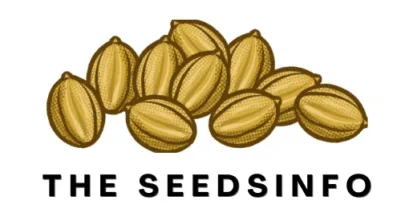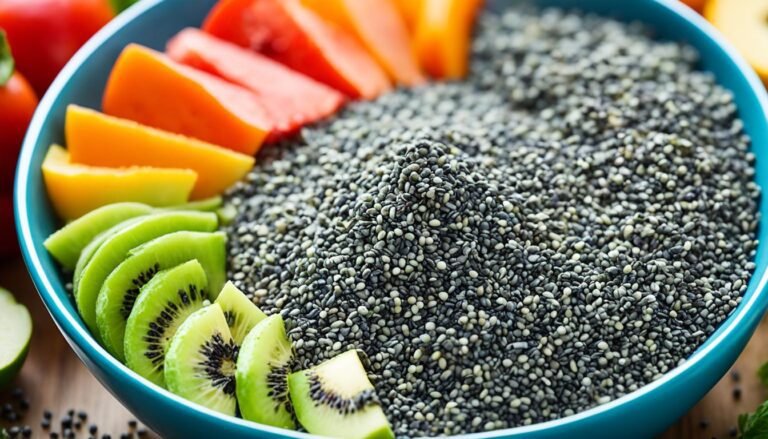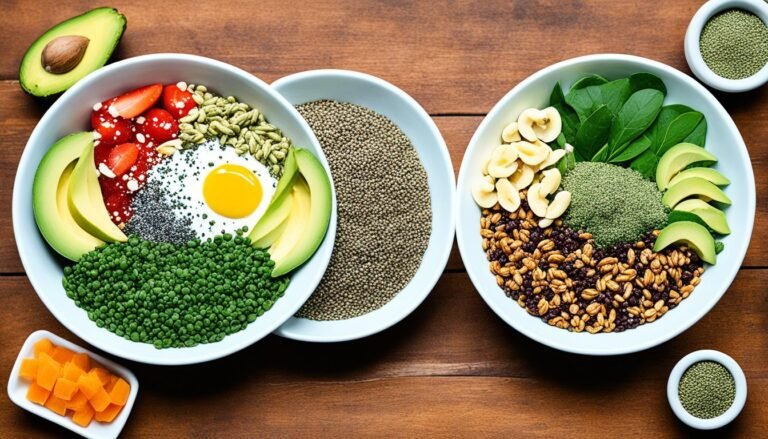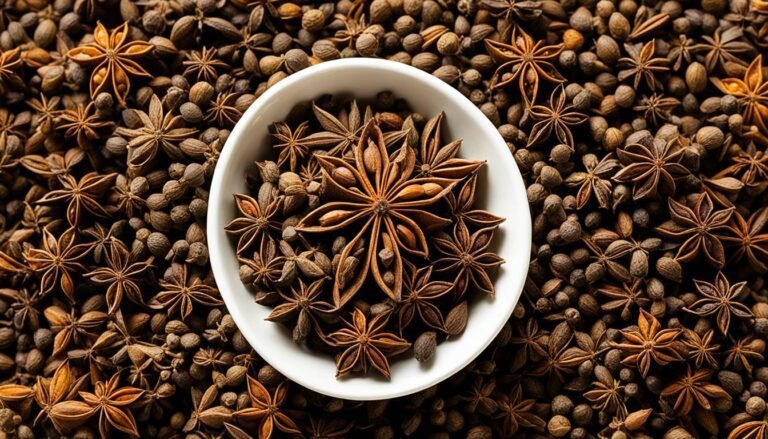Basil Seeds: Superfood for Health and Wellness

Did you know Dr. Gundry has done over 10,000 heart surgeries? He’s a top expert in how what we eat affects how healthy we are. His work on basil seeds has shown they are an amazing superfood. These seeds, from the sweet basil plant, are filled with good nutrients and can seriously boost your health.
This guide will take you through the interesting story, rich nutrients, and many uses of basil seeds. It will help you add this amazing ingredient to your diet for better health. Whether it’s improving your digestion, helping with weight, or just eating good stuff, basil seeds provide a tasty answer you might not know about.
What are Basil Seeds?
A Brief History and Introduction
Basil seeds, called sabja or tukmaria, come from the Ocimum basilicum plant. They are small, black seeds with a rich history in Ayurveda and Chinese medicine. These seeds are from Southeast Asia, where they’ve been used for hundreds of years.
They look a bit like sesame seeds but are larger and taste different. Basil seeds are full of nutrients and are used in many foods worldwide. For example, Indian falooda and Southeast Asian dishes include these seeds. Their unique way of absorbing water makes them versatile in cooking.
Basil seeds are getting more popular as people discover their health benefits. They contain fiber, protein, and minerals that are good for you. These seeds help with digestion, control blood sugar, and provide antioxidants.
In today’s world, more people are interested in natural foods. Basil seeds stand out because they are good for you and can be used in many dishes. Knowing where they come from helps us understand why they are so popular now.
Nutritional Profile of Basil Seeds
Basil seeds are a powerhouse of good nutrients, making them a superfood. A single tablespoon holds many of your daily nutrient needs. They are truly tiny but mighty.
Basil seeds are packed with dietary fiber. A tablespoon gives you 7 grams, which is 25% of what you need every day. This fiber helps you feel full and keeps your stomach happy.
They’re also great for omega-3 fatty acids, especially ALA. You get 1,240 mg in just a tablespoon, perfect for a healthier heart.
Minerals in basil seeds are no joke. They give you 15% of your daily calcium, 10% each of magnesium and iron, and lots of potassium and zinc. They’re a mineral treasure trove.
| Nutrient | Amount per Tablespoon (13g) | % of RDI |
|---|---|---|
| Calories | 130 | – |
| Total Fat | 6g | 9% |
| Saturated Fat | 0.5g | 3% |
| Carbohydrates | 5.5g | 2% |
| Fiber | 7g | 25% |
| Protein | 5g | 10% |
| Calcium | 190mg | 15% |
| Iron | 1.5mg | 10% |
| Magnesium | 40mg | 10% |
| Omega-3 (ALA) | 1,240mg | – |
Basil seeds are a power combo of fiber, omega-3, and minerals. They boost your health in many ways. Adding them to your meals is an easy way to do something good for your body.
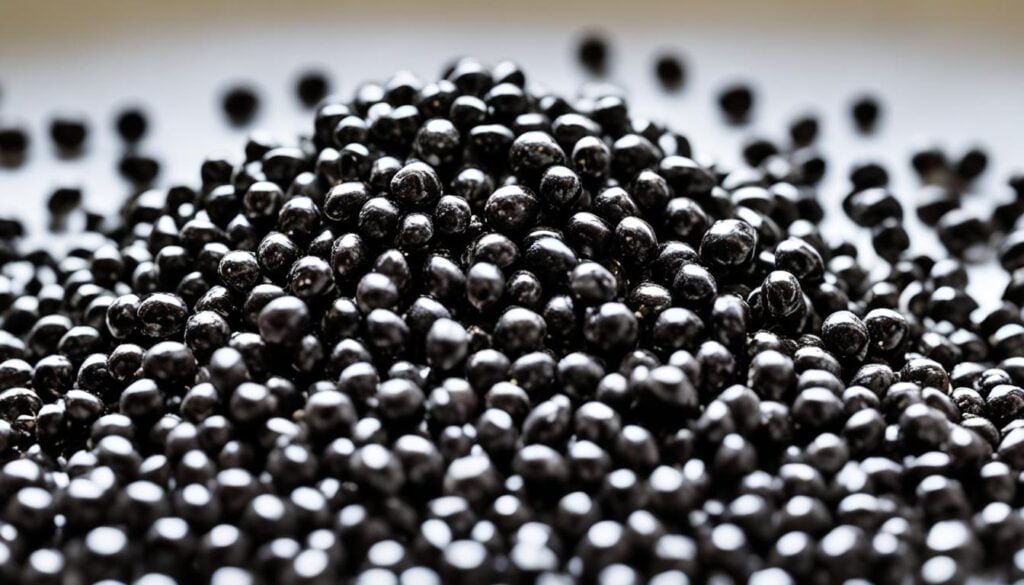
Health Benefits of Basil Seeds
Potential Benefits Based on Scientific Research
Basil seeds are more than just a kitchen staple. They are considered a superfood because they are rich in nutrients. These nutrients include fiber, omega-3 fatty acids, and antioxidants. They can help in many health areas.
The soluble fiber in basil seeds is good for your gut. It can also help with keeping your blood sugar in check. It’s even shown to improve your cholesterol numbers.
ALA omega-3 fat in basil seeds is good for your heart. It has anti-inflammatory effects and may lower the chances of heart disease and diabetes.
The flavonoids and other antioxidants in basil seeds can fight oxidative stress. They might even have antibacterial and anticancer properties. But we need more studies to be sure.
| Potential Health Benefit | Supporting Evidence |
|---|---|
| Gut Health and Blood Sugar Control | The soluble fiber in basil seeds is linked to gut health and blood sugar regulation. |
| Improved Cholesterol Levels | Basil seeds’ fiber can lower bad cholesterol (LDL) and raise good cholesterol (HDL). |
| Anti-inflammatory Effects | The ALA omega-3s in basil seeds fight inflammation. |
| Reduced Risk of Heart Disease and Diabetes | They may cut the risk of heart disease and type 2 diabetes. |
| Antioxidant Protection | These can protect against oxidative stress. |
| Antibacterial and Anticancer Properties | Early findings hint they might fight bacteria and cancer. But more study is needed. |
Using basil seeds in your meals is a smart move. They are loaded with good nutrients. This can help from better gut health to less inflammation. It plays a role in keeping you healthy overall.
basil seeds for Culinary Uses
Basil seeds, or sabja, are a great addition to your cooking. They have a mild taste and mix well in food and drinks. They’re great for making creamy treats thicker and fun drinks more interesting.
They’re also a natural way to thicken food. After soaking, they turn into a gel, perfect for making things like ice cream, dressings, and yogurt. They make food thicker while keeping it smooth.
In drinks, basil seeds work wonders. You can use them in a cool basil seed drink, a healthy basil seed smoothie, or a tasty basil seed lemonade. They add a fun, jelly-like feel to drinks, making them more enjoyable.
But basil seeds are not just for drinks. You can use them in baked goods too, like bread, muffins, and desserts. They soak up moisture and give a nice crunch. This makes them a great choice for all kinds of recipes.
| Basil Seed Product | Description | Price |
|---|---|---|
| Basil Microgreens Mix | A packet containing approximately 17,000 basil seeds | $6.22 |
| Basil Seeds (Romanesco Variety) | 100 seeds per pack, 55-85 days to maturity | Buy 10 for $2.50 each and save 64% |
Basil seeds are perfect for thickening, adding a unique touch to drinks, or baking. Enjoy the variety they bring to your cooking.
Growing and Sourcing Basil Seeds
Tips for Cultivating and Purchasing Quality Seeds
You can find basil seeds at Asia stores and online shops. Seeds for planting are a bit more costly than eating seeds. When buying for cooking, pick seeds marked as “edible” or “food-grade” to avoid pesticide use.
Basil likes warm weather and grows from spring to autumn in Zones 9-10. In colder Zones 2-8, plant seeds before the final frost, about 4-6 weeks. Always give basil plants space by planting them 8 inches apart.
- Give your basil plenty of sunshine for the best growth.
- Make sure the soil drains well to avoid overwatering.
- Keep the soil moist but not soaked by watering regularly.
- To keep a steady basil supply, plant new seeds every two weeks.
- Basil thrives in pots if the container is deep enough, at least 10 inches.
- Cut basil back a lot at the end of summer to get more leaves in the fall.
- Plant basil near alyssum, nasturtium, tomatoes, and cucumbers for a nice and fruitful garden.
At the end of the growing season, harvest basil seeds for a fresh supply. Snip the top of plants and keep the stalks in paper bags to catch seeds. After the seeds turn brown and dry, store them in a cool, dry spot in an airtight container.
Incorporating Basil Seeds into Your Diet
Basil seeds are not only nutritious but also versatile, making them a great addition to anyone’s diet. They’re high in fiber and protein. This helps you feel full longer, useful for those trying to manage their weight.
Soaking basil seeds in water turns them into a gel. You can then add this gel to smoothies, yogurt, or oatmeal. This makes you feel full, which could help control your appetite and reduce how many calories you eat.
If you want a tasty drink, add basil seeds to your water, iced tea, or lemonade. They add flavor and help keep you hydrated, an important part of any diet.
They’re also great on top of salads, soups, or sauces, adding a nice crunch. You can even bake with them, putting them in breads or muffins.
Start with 1-2 teaspoons of basil seeds a day. Then, slowly increase. Don’t forget to drink plenty of water, as basil seeds soak it up, which could make you need more.
If you have health issues or are on medication, talk to your doctor first. Using basil seeds wisely can offer many health and weight benefits.
Precautions and Side Effects
Basil seeds are usually safe for everyone. Yet, they can lead to digestive problems like bloating. This happens more often when you’re just starting to eat them. Begin with small amounts and slowly add more over time. This will help your stomach get used to them.
If you have diabetes or take certain medicines, talking to your doctor first is wise. Basil seeds’ fiber and omega-3s might change your blood sugar or how your drugs work. It’s smart to be careful about your health.
Potential Drawbacks and Interactions
Basil seed interactions: These seeds could affect how some medicines work, such as those for blood clotting or diabetes. If you have a health issue or take prescription pills, check with your doctor before using basil seeds.
Basil seed side effects: Some may feel stomach issues like gas or diarrhea with too many basil seeds. This is because of their rich fiber content. To avoid these problems, start slowly and increase your seed intake gradually.
Basil seed precautions: People with diabetes or thyroid issues should be careful with basil seeds. The fiber and omega-3s can alter blood sugar or thyroid health. Always talk to a healthcare provider if you have a health condition before trying basil seeds.
Generally, basil seeds can be a great health boost, but using them in moderation is vital. Knowing about possible issues and talking to your doctor can help. This way, you can enjoy the benefits of these powerful little seeds without worry.

Basil Seeds vs. Chia Seeds
Basil seeds and chia seeds are both popular for their health benefits. Chia seeds are rich in omega-3 fatty acids. They contain a lot of ALA, which is great for your health. Basil seeds, though, are better for fiber. They have twice as much fiber as chia seeds do.
Basil seeds also lead in minerals like iron, calcium, and potassium. They provide more prebiotics too. Prebiotics are important for your gut health.
Hydration and Texture
Basil seeds soak up water and develop a gel-like layer in 3 minutes. Chia seeds need 20 minutes to get a similar soft texture. This is a key difference between the two seeds.
Availability and Cost
Chia seeds are easy to find and are popular worldwide. Basil seeds, on the other hand, are hard to find. It can also be tough to find organic basil seeds. This means basil seeds are usually more costly than chia seeds.
Culinary Versatility
Both seeds taste mild, making them great for various dishes. You can use them in smoothies, baking, or desserts easily. They add nutrition and texture to your food.
Choosing between basil seeds and chia seeds is up to you. It depends on what you like, what’s available, and what nutrients you need. Both seeds bring health benefits to your diet.
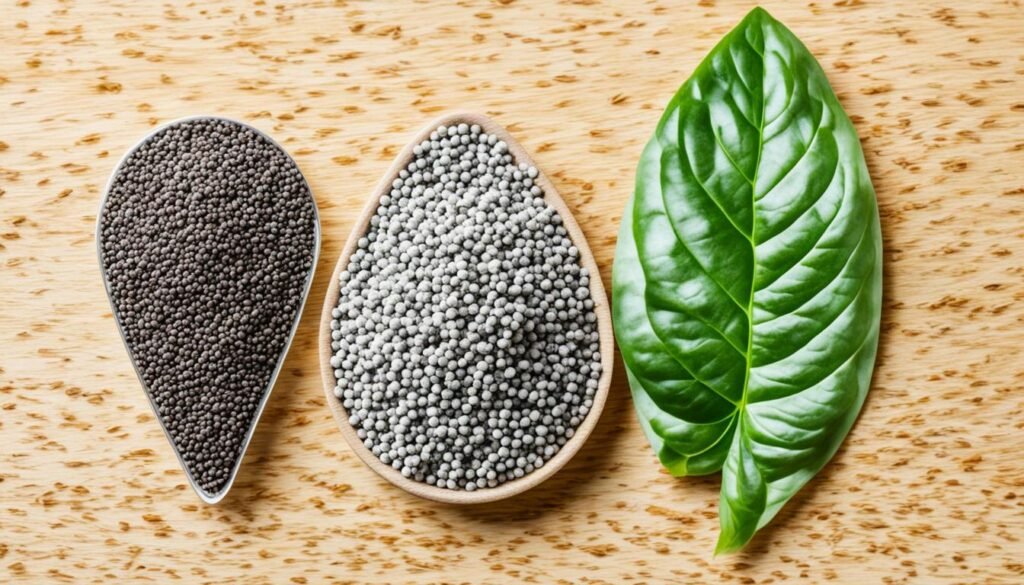
Fascinating Facts about Basil Seeds
Basil seeds are packed with nutrition and have a long history. They are used in various ways, not just for good health. They are part of traditional foods and practices that go back thousands of years. This shows their wide use and interesting nature.
In places like India and Southeast Asia, people have used basil seeds in their foods and drinks for a long time. A favorite drink is called falooda, which contains milk, sweet syrups, and basil seeds. Basil seeds help make foods thicker and stable, improving things like ice cream and salad dressings.
These seeds also have antioxidants which could be good for your health. There is still a lot to learn about their benefits. But, it’s exciting to see how basil seeds might help us feel better overall.
The story of basil seeds is as interesting as their use today. They started in India more than 4,000 years ago and traveled across the ancient world through the spice route. They eventually made their way to Europe. Now, there are more than 150 varieties of basil. Each type differs in leaf shape, color, scent, and taste.
We can use basil seeds in many ways, from traditional dishes to new health products. They add something special to a healthy diet and lifestyle. Exploring the uses of basil seeds can teach you a lot about food and history. This makes basil seeds an exciting part of learning about wellness.
| Nutritional Comparison: Basil Seeds vs. Chia Seeds |
|---|
| Basil seeds: 60 calories, 7g carbs, 7g fiber, 2g protein, 2.5g fat, 1,240 mg omega-3s per 1 tbsp (13g) serving Chia seeds: 138 calories, 12g carbs, 11g fiber, 5g protein, 9g fat, 5g omega-3s per 1 oz (28g) serving Basil seeds have almost twice as much fiber, potassium, iron, and calcium as chia seeds Basil seeds have 0g net carbs per serving, while chia seeds have 1g net carbs Basil seeds swell and absorb water faster than chia seeds |
Conclusion
Basil seeds are a nutrition powerhouse. They bring fiber, minerals, and omega-3s. They also fight off illness with their antioxidants and reduce inflammation. Adding basil seeds to your diet makes sense, whether in drinks, treats, or meals.
These seeds offer more than just nutrients. Their mild taste and fun texture can upgrade your meals. By making basil seeds a part of your daily routine, you choose a healthier life. These tiny seeds are nature’s special gift for your well-being.
Basil seeds don’t stop at nutrition. They help with digestion, keep your heart strong, and even boost your skin and hair. Dive into the benefits of this amazing superfood. Make it a part of your life for a brighter, healthier you.
FAQ
What are basil seeds?
Basil seeds come from the sweet basil plant. They are also known as sabja or tukmaria seeds. These seeds are well-used in various traditional medicines like Ayurveda and Chinese herbal practices.
What is the nutritional profile of basil seeds?
Basil seeds are very nutritious. Just one tablespoon gives you 15% of your daily calcium needs. You also get 10% of magnesium and iron. Beyond that, it provides 7 grams of fiber, a quarter of the daily recommended amount. These seeds are a rich plant-based source of omega-3 ALA, with 1,240 mg in a tablespoon.
What are the potential health benefits of basil seeds?
The fibers, antioxidants, and omega-3s in basil seeds can do a lot for your health. They help your gut, blood sugar, and cholesterol. The omega-3 in them is good for your heart and might fight diabetes. Basil seeds’ antioxidants could even help prevent cancer and fight bacteria.
How can basil seeds be used in cooking and baking?
Basil seeds are quite versatile in the kitchen. They don’t really change the flavor of your food or drinks. You can use them to thicken up ice cream, dressings, and yogurts. When soaked, they get this gel-like texture that’s great for drinks, desserts, and baking.
Where can I purchase basil seeds and how can I grow them at home?
You can buy basil seeds at Asian markets or online. For eating, make sure the package says “edible” or “food-grade.” It’s best to avoid seeds for planting due to potential pesticides. Growing basil at home is easy. Just make sure it gets plenty of sun, has well-drained soil, and you water it regularly.
Are there any precautions or side effects to be aware of when consuming basil seeds?
Basil seeds are safe to eat for most people. But they are high in fiber, which could cause bloating or gas. Start with small amounts if you’re not used to them. Then, increase as your body gets used to it. People with diabetes or on certain medications should talk to a doctor before eating a lot of basil seeds.
How do basil seeds compare to chia seeds?
Basil seeds and chia seeds are quite similar in their nutritional values. They’re both high in fiber, protein, and minerals. However, chia seeds have more omega-3 ALA fat. Basil seeds, on the other hand, have more fiber. Basil seeds turn into a gel faster when soaked. In terms of taste, both have very mild flavors and can be used in similar ways in food.
